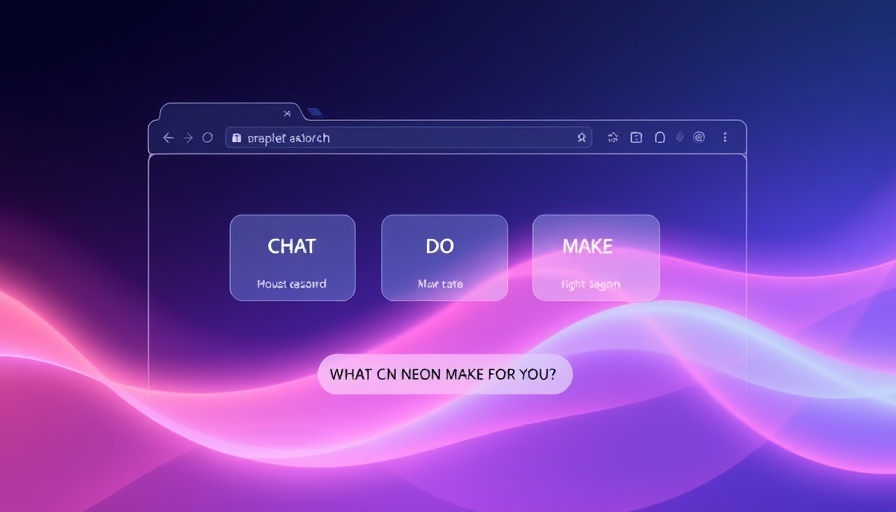
Help Is on the Way: Opera's AI Browser Revolutionizes Online Tasks
In a world where efficiency is increasingly crucial, Opera is making waves with the announcement of its new AI-driven browser, Opera Neon. Marked as the first 'agentic browser', this innovative tool promises to turn our web surfing experience into one of unprecedented automation and convenience. With the ability to perform complex tasks such as coding, designing, and even creating games while the user is offline, Opera Neon is raising the bar for how browsers interact with users.
The Rise of Agentic Browsers: What Does This Mean for Users?
Agentic browsers, such as Opera Neon, navigate the evolving intersection of artificial intelligence and daily productivity. Designed to operate more like a virtual assistant than a traditional browser, Neon aims to significantly enhance the way we complete tasks online. According to Henrik Lexow, Opera’s senior AI product director, "AI can fundamentally change the way we use the internet and perform all sorts of tasks in the browser," indicating a shift towards a more intuitive online experience.
How Does It Work?
Opera Neon uses advanced AI agents to facilitate a wide array of online functions. This multimodal approach allows the browser to engage in various tasks simultaneously, such as building websites or compiling reports, all powered by a cloud-based AI engine. This capability addresses a growing demand among users for technology that anticipates their needs and acts on their behalf, easing the pressure of multitasking.
The Competition: How Opera Neon Compares to Existing AI Technologies
While Opera Neon is on the frontier of AI browser technology, it is not operating in a vacuum. Competitors like Microsoft with its Copilot and OpenAI's Operator are also harnessing AI to simplify user interactions. Unlike these established tools, Opera promises a more integrated experience whereby coding and game development can occur simultaneously, independent of the user's online presence.
Challenges Ahead: Will Opera Neon Live Up to Its Promises?
Despite Opera’s ambitious promises, challenges remain. The company has not yet disclosed the launch date or pricing for Neon, adding uncertainty to the hype. Users may be left wondering if the highly anticipated AI capabilities can deliver on their substantial expectations. As the landscape of AI technology expands, user skepticism may pose a hurdle for adoption unless Opera demonstrates tangible, practical benefits.
Future Predictions: The Emerging Role of AI in Browsers
As the tech industry continues to evolve, the role of AI in enhancing user experience is likely to expand. Browsers, traditionally seen as tools for navigation, are evolving into comprehensive platforms capable of transforming how we engage with content. The emergence of agentic browsers like Neon could lead to a future where AI tools are seamlessly embedded in our daily online activities, making digital interactions smoother and more efficient. With continuous advancements in machine learning and natural language processing, we may soon see capabilities that were once confined to science fiction.
Making the Most of AI Technology Today
While we await Opera Neon’s release, users can start exploring existing AI functionalities that are revolutionizing online work. Integrating current AI solutions into your routine can enhance productivity and streamline workflows. Consider tools that automate mundane tasks or those that offer intelligent suggestions to improve your projects. As AI technology becomes more accessible, investing time in learning these tools will prepare users for the future landscape of digital work.
In conclusion, Opera Neon is an inherently promising step forward in the fusion of AI and internet browsing. Whether it fulfills its potential is yet to be seen, but it undeniably sparks curiosity and ambition within the tech community. While waiting for Operas' application of these features, users are encouraged to familiarize themselves with existing technologies that can optimize their online experiences. Stay alert, as this technology starts reshaping our web interactions.
 Add Row
Add Row  Add
Add 




 Add Row
Add Row  Add
Add 
Write A Comment